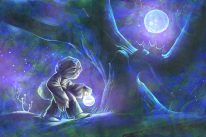
“Being heard is so close to being loved that for the average person, they are almost indistinguishable.” ~David W. Augsburger
The five love languages—a framework for how we give and receive affection created by psychologist Gary Chapman in 1992—include quality time, gifts, acts of service, words of affirmation, and physical touch.
As much as I love receiving all five demonstrations of care, I’ve always felt that my truest love language was missing from this list.
My love language is curiosity. I show others I care for them by asking questions, learning their experiences, and being hungry for the essence of them beneath the small talk and the pleasantries. I want to see them for who they are and know what makes them tick. And I, too, want to be loved this way.
Like many recovering people-pleasers, I spent most of my life over-attuned to others’ moods and needs, accustomed to relationships in which I did all of the seeing but rarely felt seen.
While I know that people-pleasing is usually an outdated coping mechanism from childhood, I also know that my ability to get curious about others is my superpower. Regardless of its origin, it is just as much a part of me as my eye color or my heritage.
This desire to deeply understand others is a quality about myself that I love, something that I do just as much in service to myself as in service to others.
For years, my curiosity often led me to play the role of confidante and cheerleader in my relationships. Friends, partners, and acquaintances said I was an “exceptional listener.” And while I appreciated their praise, I often felt that folks cherished my companionship the way they would cherish a finely polished mirror—a smooth surface in which they could admire their own reflection.
As I’ve gotten older, I’ve determined that I’m no longer willing to be a part of one-sided relationships in which I know others inside and out, but they regard me as a foreign language. I want a person who can put their ego aside and get curious. I want someone who maps my terrain eagerly, who crests the peaks and sprints into the jagged valleys of my tales, who overturns stones for what lies hidden beneath.
As someone who spent much of her life feeling unseen, I notice when someone really makes an effort to see me.
I notice when people look directly into my eyes and ask, “But really—how are you feeling today?”
I notice when people share a story and then pause to ask, “Have you ever experienced anything like that before?”
I notice when others seem just as comfortable holding space as they do taking up space.
I notice when folks treat conversations like opportunities for co-creation instead of pedestals from which to preach.
I also notice when people ask perfunctory questions and, moments later, check their phones or stare off into space.
I notice when others use my stories as springboards to leap into their own experiences.
I notice when I’m interrupted repeatedly by someone who is so eager to speak that they can’t fathom making room for anyone else.
I notice when people use me as a sounding board or a therapist with no reciprocity in sight.
With time, I have learned to leave these relationships behind. They drain me energetically and, by participating in them, I teach myself that I am not worthy of more.
I distinctly remember a friendship where, after every afternoon spent together, my body craved a two-hour nap. I remember other connections that left me feeling hallowed out and sunken, like a withered plant that hadn’t seen a glimpse of sun in weeks.
Ultimately, it was my responsibility to shift this pattern and make space in my life for healthier connections. I could continue to feel victimized by one-sided relationships, or I could leave them behind and trust that I deserved better—and that better existed.
We co-create these healthier, reciprocal connections by communicating, clearly, what we need in order to feel seen. The love language framework is so valuable because it gives us a simple, casual way to do so. After all, we can’t expect others to read our minds and know automatically what’s best for us.
This is why I’ve learned to say to friends and prospective partners early on, “My love language is curiosity. I feel most loved when others ask questions and want to understand me.” By offering this simple truth, we give others the information they need to love us well. Whether they choose to act on that information is up to them.
If we find ourselves in relationships that are one-sided, we need to be willing to let them go, and embrace the initial loneliness that comes from leaving the old while awaiting the new. We need to learn to trust that we are interesting, that our experiences are valuable, and that our words are just as worthy of space as anyone else’s.
With every new relationship that makes space for the essence of us, the more believable these truths become.
About Hailey Magee
Hailey Magee is a Codependency Recovery Coach who helps individuals conquer people-pleasing, set empowered boundaries, and master the art of speaking their truth. She has worked with over 100 clients from the US, Canada, Ireland, France, South Africa, and more. Sign up for a complimentary consultation to learn how coaching can help you live from a place of authenticity and inner freedom. You can follow Hailey on Facebook and Instagram, or visit www.haileymagee.com.
- Web |
- More Posts












 Though I run this site, it is not mine. It's ours. It's not about me. It's about us. Your stories and your wisdom are just as meaningful as mine.
Though I run this site, it is not mine. It's ours. It's not about me. It's about us. Your stories and your wisdom are just as meaningful as mine.
Interesting. I thought people pleasers were happy go lucky people and enjoyed pleasing people.
I was not aware there could be a downside. Great to see you put your needs and well-being near the top of the list.
Thanks for your words, @dogotek:disqus!
Have you considered sharing and expressing yourself without a question? Like you did today! You don’t need permission from others to speak, share and express yourself.
A lot of friendships simply expect others to share freely. The other person isn’t a mystery to get to the bottom of. By prizing your own curiousity, you’re expecting this quality in others and whilst some people share it, many don’t. You’re missing out on relationships with people that are different from you.
It doesn’t necessarily mean that they don’t care. It means that you’re refusing to share unless asked a direct question, potentially multiple times I.e. “But how are you really?”.
My question to you is why don’t you like to share and express yourself without being asked questions?
I don’t know if you’re aware of Human Design, but this “system” that combines the I Ching with Astrology, says there are 5 types of humans. Within this, there is one category called “Projectors”. These people, a small % of the population, are often not seen and when they do speak up, what they say seems to vaporize, as if no one heard it, as if it was never said. I am one of these people. I am also an expert listener, so I understand what Haley is talking about. It’s a gift but often creates a dynamic where “we” are never given the same listening ear we lend others, which in the end is not satisfying.
I am aware there are people and relationships where those involved are just automatically expected/invited to share whatever whenever. Keeping that in mind with my friends who are “talkers”, I sometimes try to speak up and share what is going on with me, share what I wish they’d ask me about but don’t.
The point of writing this in response to your comment is to share that with Projectors, we need to be invited to share. Otherwise, as I say, our perceptions are not seen/heard/appreciated. It is challenging being a Projector, but for me it has been helpful to “know” about this system and the “type” I am – to understand what happens due to my nature in combination with other types.
You can get a free Human Design on various sites – in case you’d like to try it and see what might be a fit and useful information for you about you! 🙂
Hi Robin! I’m curious, what makes you feel like your contributions to conversations are not appreciated unless you’re encouraged to speak? Has anyone told you this?
I get it, I’ve experienced my share of social anxiety and communication issues.
We are all trying to be heard, some people are more skilled at communicating than others. This doesn’t mean that we can’t improve our communication skills.
I would suggest that people who don’t notice your contributions to conversations are simply focused on their own contributions to conversations. Talking one-on-one is a good place to start as this avoids distractions.
Assertiveness and the ability to advocate for yourself, I feel are some of the most important skills you can develop.
If someone interrupts you while you’re speaking politely interject with “Excuse me, I wasn’t finished speaking.”
If people don’t stop talking for a while and leave a space for you to interject feel free to interrupt them. “Sorry for interrupting, I’d just like to say…”
And if your relationship is good enough with the person. You can simply point out when you’re not given an opportunity to talk and how that makes you feel. You could say something like “I have been having difficulty finding a gap to speak during the conversation, this makes me feel left out.”
Hi Helena,
I have experience and skill in this area, and have tried what you suggest but I don’t like the feeling of having to fight to be heard. It’s not my nature and I don’t want to have to do that. Once in awhile, yes, but not as a rule. It is a FEELING – this of not being seen/heard. I am complete with this conversation. Thank you for offering your perspective and desire to be helpful. I’m not feeling the need for help here. Best wishes.
That’s a shame Robin, because this feeling of not being seen or heard comes from yourself and your refusal to act.
Your dislike of “fighting to be heard” is based on an anxiety response.
Assertiveness is not fighting, but it will feel uncomfortable until you get used to it. Sometimes progress is measured by how long you’re willing to sit with feelings of discomfort until you’re desensitised to them.
@helenacook:disqus, while I agree that being assertive and confident in our communication can greatly affect the desire to which we feel seen, I don’t agree that feeling unseen is entirely based on one’s “refusal to act.” This completely negates the fact that conversations are a two-way street, and that we as humans are attuned to others’ responses. If I’m trying to share something with Bob, but Bob is staring off into space, checking his phone, or interrupting me to share his personal story, I will not feel seen — regardless of how assertively I attempt to communicate with him.
This was sooooo so so well-written and honest. I resonated with every word and I feel we are very similar in this regard. I can appreciate how the realization of your love language came through navigating many relationships that weren’t for you. Thank you for this 🙂
Wow, sounds like we have similar stories @adanexha:disqus — thanks for sharing.
Good stuff!
Thanks, Randall!
YES! SO MUCH THIS.
Thanks for reading, @disqus_1dMEdyPY7G:disqus!